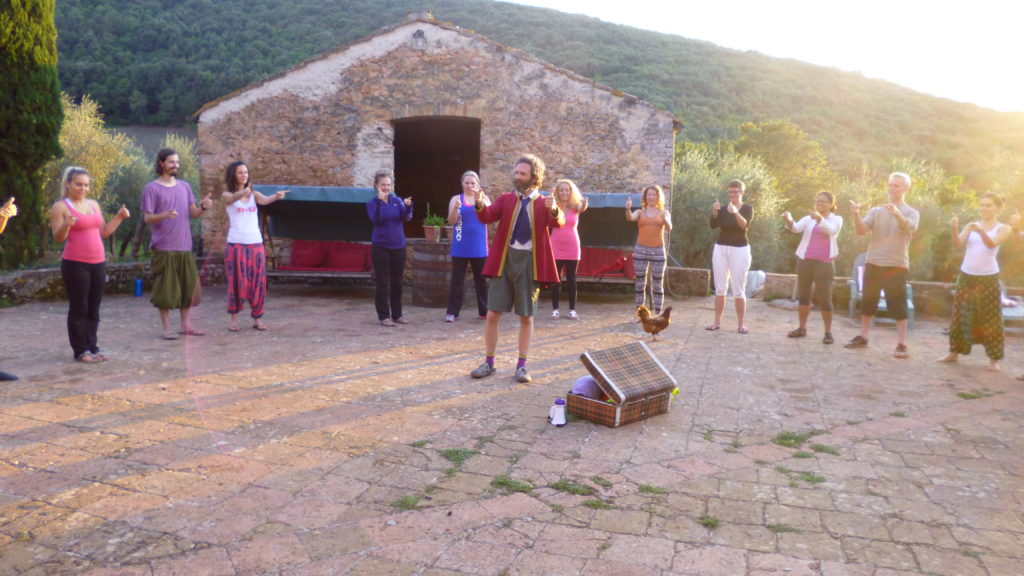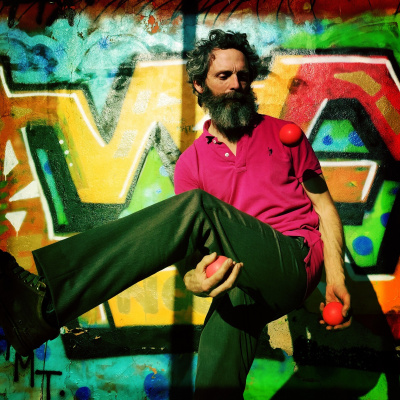Juggling and Playfulness: Wasn’t Juggling Supposed to Be Fun?
This last year, I’ve been researching playfulness in greater depth. It has always been an important part of my juggling work as a performer and teacher, and I just decided to dive in a little deeper. What I’ve seen is that play and playfulness can be a solid healthy base for any activity and it doesn’t have to be something that comes after hard work. Work and play can go hand-in-hand. Even serious jobs can find elements of play. Play doesn’t make us, or our work, childish, although kids love to play and are mostly allowed to. And being playful isn’t something that makes us less professional. Take what you do seriously, but not yourself!
A playful mindset is the stuff that builds great artists, sportsmen, scientists, and thinkers, and it can give an edge to anybody in their own field. The curiosity, concentration and generosity that a playful mindset allows us takes us much further into quality and innovation and makes us feel great along the way. Playfulness becomes an attitude, and a way of living. As jugglers, becoming more playful in this dreary world, can have multiple benefits:
- Our training sessions become more enjoyable, exciting and unexpected
- The quality of our juggling ability increases
- We have more fun (wasn’t juggling supposed to be fun?)
- We find our own personal way of expressing ourselves through juggling
- Our performances become more alive and we can really start to contribute to make this world a better and more enjoyable place to live in. Enthusiasm and playfulness are contagious!

There are many reasons why adopting a playful mindset can be challenging. One of the big reasons is that four hundred years ago or so Time was declared as Money. Since then, we have been invited to become extremely efficient and anything done for its own sake was considered a waste of time. This insistent striving to be efficient is ironically one of the biggest killers to playfulness and therefore to creativity, innovation and enjoyment.
Our schooling system is set up to make us efficient workers, so in effect, even though playfulness is our birth right, it’s not cultivated past a young age. We could say it has been drummed out of us. It would be good to re-appropriate a little of it though!
The Four Types of Jugglers
Playfulness implies having a more open and lateral mind set and this allows us to learn through the experience of others. The magazine “Runner’s World” noticed there are four types of runners. In my opinion, these can be easily compared to jugglers.
These four are: the exerciser, the competitor, the enthusiast and the socialiser.
The enthusiast and the socialiser are more likely to be engaged in pure play, pursuing the activity for the joy of it. When the exerciser and the competitor feel low on moral, not meeting up with their own expectations, they are no longer in play. The excitement of competition however, with others or with one’s self, can be a necessary and healthy part of a competitor’s play. You could say that an exerciser trains to get something out of it and play is often not a priority.
Sometimes running (and juggling) is playful and other times not. The difference is in the emotion. Playfulness is a state of mind and attitude rather than any particular activity in itself. In other words, it’s up to us to find the fun and if we’ve lost interest, it’s up to us to find a new way of looking at it. Play has many levels–from solitary play, such as playing with a toy car, to highly engaging physical group activities that has everyone in laughter.
In games we don’t always win, it would make it terribly boring! Playful pros realise things rarely go as planned and see the humour in things.
The definition of play given by Stuart Brown,founder of the National Institute for Play is“an absorbing, apparently purposeless activity that provides enjoyment and a suspension of self-consciousness and sense of time. It is self-motivating and makes you want to do it again.” This definitely sounds like juggling. Especially in the beginning. After a few years though, it can lose it’s fun, but it doesn’t have to. It depends on the game we are playing. The game of the ‘ever more difficult’ might not be the most fun at some point. This added to the pressure of finding work and performing as a budding pro can also more or less kill the fun in juggling but it need not.There are many ways to rekindle a sense of playfulness and fun. Any action or attitude can either bring more playfulness into our lives or keep it out. I offer some suggested ways to explore methods for avoiding burnout and finding fun, but you should adjust them to work for you:
How to Regenerate a Playful Mindset:
- Look for novelties, variations and new combinations of tricks. (Even very small variations or seeing the same thing in a new way can catapult us into fun)
- Before training, move your body, perhaps even dance
- Be more realistic and adaptable in training sessions
- Improvise to music or just don’t know what you are going to do next
- Try tricks you’ve got solid in a different manner: walking, moving in space, as fast as possible etc.
- Be fully present and aware of your body, thoughts, emotions, and connection to your props in your session
- Challenges can make juggling much more fun but keep a light attitude, the fun is in the trying. (If we get what we’re trying it’s a bonus. A moment of rapture!)
- Remember that playfulness is ultimately putting great care and love into what we are doing
Watch Out for These Destroyers of Playfulness:
- Perfectionism (Having to get that trick, combo or routine exactly as you planned)
- Comparing ourselves to others (this can be a strange one, on one hand, it can be highly motivating but on the other hand it can also be quite demoralising as there’s always someone “better” than us)
- Professionality (When we dive into a role that basically stops us from having fun)
- Repetitive daily routine (Eat something different for breakfast every now and then!)
- Being a “know-it-all.” (Rather be aware of the old adage, “The more I know, the more I know I don’t know”)
- Doing everything in a rush and just skimming through
- Stress and worries about anything
It might seem that beginners and hobby jugglers have more possibility of engaging in play and fun as they don’t have to do it for a living. But for many jugglers, being able to train each and everyday and be paid for it seems like a dream.As a professional though, how to live this dream and keep on having fun? Some people find it useful to feel as though they are always playing a game. In games we don’t always win, it would make it terribly boring! Playful pros realise things rarely go as planned and see the humour in things.
As a professional, we can touch the lives of many people. Keeping this in mind can help bring out the best in us (the more playful, generous, kind part) and give less energy to the jealous, serious, prima donna part of us. The more heart we put in, the more we’ll feel good about what we’re doing. Cultivating playfulness for pros starts in the training session. Try and make it as alive as possible. If you see it as a chore, something is wrong. Don’t get me wrong, it’s hard work, but if we find ourselves forcing too much we’ll end up losing the pleasure. Look for the new, work out how to inspire yourself, cultivate a deep sense of gratitude. The connection between playfulness and gratitude might not seem obvious, but start appreciating yourself and others, say thank you a little more and you’ll see what I mean. Find ways of taking the pressure off yourself. Get some help with promotion. You can’t do everything yourself. What is the message you’re bringing to the world through your art? Work with other artists and jugglers too and try out various collaboration projects.
It really doesn’t take much to dive more into fun, try out even just one of these ideas and you’ll see your workspace transform into a playground of delights!
Related content: Pearls of Juggling–Wisdom & Advice form Anthony Trahair
All photos provided courtesy of Anthony Trahair...
Do you have a story to share? Submit your news story, article or press release.




